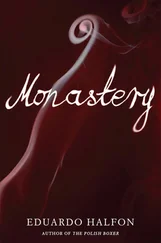Eduardo Halfon - The Polish Boxer
Здесь есть возможность читать онлайн «Eduardo Halfon - The Polish Boxer» весь текст электронной книги совершенно бесплатно (целиком полную версию без сокращений). В некоторых случаях можно слушать аудио, скачать через торрент в формате fb2 и присутствует краткое содержание. Год выпуска: 2012, Издательство: Bellevue Literary Press, Жанр: Современная проза, на английском языке. Описание произведения, (предисловие) а так же отзывы посетителей доступны на портале библиотеки ЛибКат.
- Название:The Polish Boxer
- Автор:
- Издательство:Bellevue Literary Press
- Жанр:
- Год:2012
- ISBN:нет данных
- Рейтинг книги:4 / 5. Голосов: 1
-
Избранное:Добавить в избранное
- Отзывы:
-
Ваша оценка:
- 80
- 1
- 2
- 3
- 4
- 5
The Polish Boxer: краткое содержание, описание и аннотация
Предлагаем к чтению аннотацию, описание, краткое содержание или предисловие (зависит от того, что написал сам автор книги «The Polish Boxer»). Если вы не нашли необходимую информацию о книге — напишите в комментариях, мы постараемся отыскать её.
marks the debut of a major new Latin American voice in English.
The Polish Boxer — читать онлайн бесплатно полную книгу (весь текст) целиком
Ниже представлен текст книги, разбитый по страницам. Система сохранения места последней прочитанной страницы, позволяет с удобством читать онлайн бесплатно книгу «The Polish Boxer», без необходимости каждый раз заново искать на чём Вы остановились. Поставьте закладку, и сможете в любой момент перейти на страницу, на которой закончили чтение.
Интервал:
Закладка:
I went back into the main room. The old man was still there. He gave me his glass again and I drank all the brandy while he and the others made fun of me. I didn’t mind much. I could still hear the piano. I was feeling a bit dizzy. I tried to ask him where the music was coming from, but he just smiled his rotten smile and clapped a few times. Piano, I shouted. Where’s the piano? Upstairs? I pointed, and he, his hand festooned with gold rings and chains, signaled to me that I should go ahead, go on up.
The stairs were steep. I started to climb up, but as I did so the sound of the piano appeared to be descending the stairs. Like a cat going down eighty-eight steps. Like it was looking for me. I reached a mezzanine or a landing with a number of closed doors. The ceiling was even lower here and the walls were painted burgundy and there was a single yellow lightbulb hanging in the middle, swinging. I crouched down. I felt hypnotized. Comatose, even. Straddling some nonexistent and probably dangerous border. But the piano was still playing. Yes, there it was, the tinkling of the piano. Close by. I could hear its tune, but I couldn’t find it. An invisible tune, I thought. An ethereal tune, I thought. It had to be Milan.
I opened one of the doors. Sitting on the edge of a rickety old bed was a very pale girl with lank black hair and big blue eyes. She seemed to be fifteen or sixteen from where I stood, but she could have been older. She had the look of someone who had just been crying. She was wearing a long turquoise skirt and a very light sleeveless white blouse. She was barefoot. Her skin shone, maybe with sweat, although I doubt it. On her wrists and ankles she wore thin chains made of fake gold coins. She looked at me sternly, almost sadly, and I don’t know why, but I stood still, holding the door handle. Suddenly, and in silence, she got up and walked slowly toward me. She put her cold hand on mine and both our hands closed the door together and then the sound of the piano faded a little. She was taller than I’d thought. I felt her face close to my face and I inhaled her breath, which smelled like rain, or perhaps it smelled like mandarins, and in her eyes I saw all the sensuality of a Gypsy woman. I heard the piano again and started to smile out of sheer nervousness. She placed her hands on my chest and pushed me into the wall. She pressed herself against me. Now her fingers were gently caressing my cheeks, my neck, my stomach; they were finding their way into my pockets and rummaging until they reached my money, maybe the last of it. I felt dizzy, feverish, and sometimes what reigns is confusion, and sometimes confusion holds the reins. She perched her little Gypsy feet on top of mine. I felt the warmth of her crotch on mine. I shut my eyes hard and put my hands on the ceiling to hold myself steady, to hold it all steady, and I listened to the muffled piano and felt how the girl’s damp hands slid down my neck and my torso, and at that moment I thought about the Gypsies’ third talent, which is a secret, and I thought about pirouettes, about all those pirouettes, and I thought that the lines of my life had been drawn to diverge at that moment, right there, at that very point, at that very second, in front of that turquoise, spectral Gypsy, and suddenly, through the cloud of smoke, I thought I saw Milan’s father’s face, which at the same time was my own father’s face, calling me in Romany or maybe in Hebrew and holding out one of his hands so that I’d take it and he could help me. The fingers of the young girl inserted themselves expertly into my pants. I opened my eyes. With my hands still on the ceiling, I put my mouth to her marzipan cheek. I wanted to tell her something, anything. But suddenly she was on her knees. She whipped my pants down almost violently, sank all the warmth of her face into me, and looked up at me beseechingly with her big sky blue eyes. The piano, I whispered in a Spanish that sounded too lascivious, trembling and smiling euphorically while feeling judged by such blue eyes, and then I thought I heard, far off, as though subliminally, as though tangled up, as though it came from inside me, as though threaded through the rest of that music and all the music of the universe, one of the syncopated melodies of Melodious Thunk. Impossible to know which one. Better that way.
A Speech at Póvoa
A few weeks ago, I got an e-mail notifying me of the subject of this conference, “A Literatura Rasga a Realidade,” “Literature Tears Through Reality,” a very beautiful phrase but one that ultimately left me no more enlightened than I’d been to begin with. The first thing I did, after having spent a few minutes scratching my bald head, was write to Manuela Ribeiro, the director of the Correntes d’Escritas Festival, to solicit her help, and to ask her if the subject was the intersection between literature and reality, or rather the way literature bursts into reality, or what? And she wrote back to me right away: Yes, that’s it. The second thing I did, having seen the names of my fellow speakers, was to write to João Paolo Cuenca, asking him to please explain it to me, this matter of how it is that literature tears through reality. But my Brazilian friend — just as confused or nervous as I was, or perhaps already at work on his own fifteen-minute speech — didn’t take long to reply: I have no idea either. So, later that night, I sat down to watch an Ingmar Bergman movie, hoping to distract myself a little. But when it was over, when I wanted to sleep, the subject of this conference returned to assail me again, and I tossed and turned in my bed. Now desperate, at about five or six o’clock on a very cold morning, my thoughts returned to the Bergman movie and I realized that right there, at the conclusion of the movie, was my answer. That, however, is the ending to my fifteen minutes, and it is best to begin at the beginning.
I suspect that my insomnia was provoked by the subject of reality — even though at that time, I should add, I was also suffering great anxiety in an attempt to obtain a tourist visa for Belgrade, going through bureaucratic procedures of kafkaesque proportions in order to visit that agreeable city where, before coming here to Póvoa do Varzim, I’ve just spent a few days in pursuit of a ghost.
What is reality? I don’t know. How do I conceive of reality? No idea. But fortunately I understood that this wasn’t to be an epistemological conference, and so, thank God, I was able to discard immediately any reflections on our awareness of reality. And so I came to this strange verb: rasga. I presumed, stumbling through the darkness, that the verb rasgar means the same in Portuguese as in Spanish, and setting aside its musical sense — in Spanish, to rasgar a guitar is to strum it — I focused on the act of breaking something, cutting it, ripping it, tearing it into pieces. I can remember imagining three things. One: someone tearing (rasgando) a piece of cloth. Two: a broken (rasgado) car window. And three: the noise made when you tear (rasga) a sheet of paper in half. With these images as my starting point (when I write, or when I want to understand anything, which is almost the same thing, I always start from images), I asked myself how it was possible for literature to rasgar reality, to break or tear it. As though reality were a piece of cloth? As though reality were a car window? As though reality were a sheet of paper? And it occurred to me that the only possible way of understanding something, or at least of making an attempt or some movement toward understanding it, is to turn to one’s own experience. Like so: What link is there, in my experience as a writer, between literature and reality? Or like so: How has my literature torn through reality? The process is always one from a hot furnace to the finger to the brain to the scream. In other words, by induction.
Читать дальшеИнтервал:
Закладка:
Похожие книги на «The Polish Boxer»
Представляем Вашему вниманию похожие книги на «The Polish Boxer» списком для выбора. Мы отобрали схожую по названию и смыслу литературу в надежде предоставить читателям больше вариантов отыскать новые, интересные, ещё непрочитанные произведения.
Обсуждение, отзывы о книге «The Polish Boxer» и просто собственные мнения читателей. Оставьте ваши комментарии, напишите, что Вы думаете о произведении, его смысле или главных героях. Укажите что конкретно понравилось, а что нет, и почему Вы так считаете.












